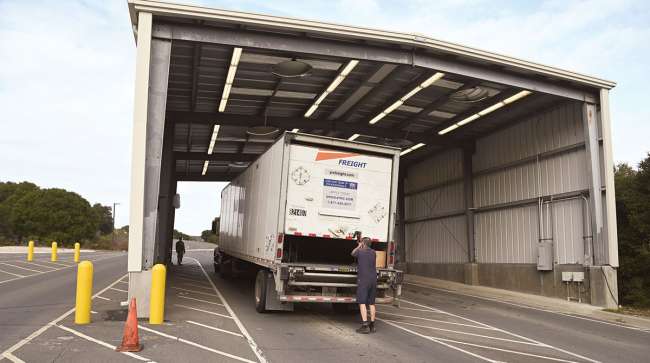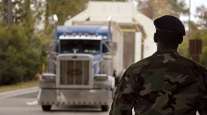Senior Reporter
NDAA on Congressional Leaders’ Fall Radar

[Stay on top of transportation news: Get TTNews in your inbox.]
With lawmakers returning to Capitol Hill after the Labor Day holiday, attention will be devoted to arriving at a final version of the National Defense Authorization Act.
During the post-summer work period, the leadership of the defense policy committees are tasked with reconciling differences in the measures to clear a bill for the president’s desk this year. Versions of the defense bill advanced in both the House and Senate before the August recess.
The must-pass legislation pertaining to programs at the Pentagon has been cleared for enactment every year dating back several decades. Specific to the trucking industry, both the House and Senate bills include a provision that mandates the Department of Defense to green-light certain standards for accessing military installations around the country.
Finalizing this comprehensive fiscal 2024 defense policy bill over the coming weeks is a priority for congressional leaders.

Schumer
Sen. Chuck Schumer (D-N.Y.), the chamber’s majority leader, called on colleagues to pursue a final version of the measure. The defense bill passed in the Senate by a vote of 86-11 on July 27.
On Sept. 5, as he outlined the fall agenda, Schumer insisted, “We also must build on the work we did during the [National Defense Authorization Act] to outcompete the Chinese government, to keep the American people safe, to protect American businesses and ensure that American innovation and technology leads the way this century.
“We also must continue standing with our friends in Ukraine now more than ever as the counteroffensive against [Vladimir] Putin’s forces is in full swing.”
Shortly after the bill’s passage, Armed Services Committee Chairman Jack Reed (D-R.I.) touted key provisions.
“This forward-looking defense bill will go a long way toward keeping the American people safe, deterring conflict and confronting the national security threats we face. This bipartisan NDAA provides a historic level of support for our troops and their families, including the largest military pay raise in decades.

Reed
“It authorizes record-level investments in the people, platforms and programs that our forces need to safeguard the nation and advance U.S. interests worldwide.”
A report prepared by the Armed Services panel, which accompanied the Senate bill, offered context about the trucking provision: “The committee notes that there is no universal access standard across the services, which can lead to project delays for military construction projects, facilities repairs and household good moves.”
On July 14, by a vote of 219-210, the House of Representatives approved its version of the defense bill. The NDAA has traditionally cleared Congress for the president’s signature, regardless of party control. In addition to defense policies, the bill includes energy and climate-centric provisions.
American Trucking Associations is among stakeholders endorsing congressional policymakers’

Transport Topics' Seth Clevenger, Michael Freeze and Mike Senatore dissect the new Top 100 list of the largest private carriers, including how fleets are adapting to this softened market. Tune in above or by going to RoadSigns.ttnews.com.
attention to issues pertaining to access to military installations and bases. For several years, these groups have championed proposals designed to assist companies that move household goods for military and civilian personnel.
“Such access standards must be consistent across military installations, include procedures to facilitate recurring unescorted access for ‘covered individuals,’ and require [Department of Defense] to accept credentials that already exist for non-DOD personnel, such as the Department of Homeland Security’s Transportation Worker Identification Credential,” ATA, ATA’s Moving & Storage Conference, ATA’s Government Freight Conference and the HomeSafe Alliance indicated in a letter this summer to the congressional Armed Services panels.
The groups continued: “To be clear, truck drivers, motor carriers and household goods movers are [Department of Defense] partners, they are generally vetted by the federal government, and many have security clearances and/or other federally recognized security credentials.”




